Leaked transcript reveals loophole in controversial refugee deal
MALCOLM Turnbull has hit back hours after the entire first conversation between he and President Trump was leaked.
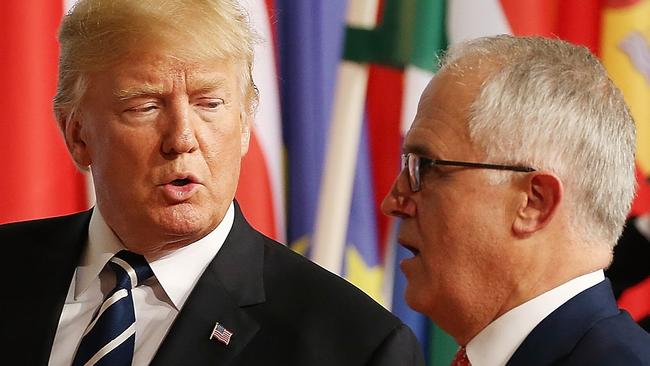
AUSTRALIA’S Prime Minister insists he and US President Donald Trump are “both adults” who can handle a heated conversation.
Malcolm Turnbull says Australia’s relationship with America remains warm despite the full transcript of a terse phone call between their countries’ leaders leaking to the media on Friday.
At a press conference in Broome, broadcast on Periscope by the Prime Minister’s media team, Mr Turnbull said he “stands for Australia’s interests” and Mr Trump “stands for America’s interests ... We have a warm relationship”.
The comments were in relation to the first phone call between the pair in January. The transcripts were published by The Washington Post and offered new details about the conversation, which centred around a controversial refugee swap between the two countries.
According to the transcript, Mr Trump told Mr Turnbull the Obama-era agreement was “stupid,” “disgusting” and “horrible,” adding: “This deal will make me look terrible... I am going to get killed on this thing.”
Friday is the first time Mr Turnbull has addressed the matter since telling reporters at the time that there was nothing to talk about.
The transcript has been pored over by experts. Lowy Institute non-resident fellow Professor James Curran criticised the language Mr Turnbull used during the phone call.
Speaking about the lengthy transcript, the University of Sydney history professor questioned the PM’s approach.
“The comment from Mr Turnbull at the end of that phone call where he says to Trump again and again ‘I’ll be there for you’ takes us all the way back to the Harold Holt and LBJ era,” he told news.com.au.

“I don’t think that sort of language is becoming of an Australian Prime Minister to any world leader and certainly not to this one.
“It’s an unfortunate use of language by Mr Turnbull and one which doesn’t speak well to Australia’s national interest and greater Australian self-reliance within the US alliance.
“It’s the language of a poodle rather than an Australian Prime Minister. It plays to the idea of us being a US lapdog.”
Prof Curran said he didn’t think the leaking of that conversation actually amounted to much.
“It just shows Trump defending an issue which was one of his signature policies that he took to the election in terms of his approach to immigration and shows Turnbull pushing the refugee deal he and Obama signed,” he said.
“I think the more serious problem here is leaking of the full transcript. It was bad enough the details of the phone conversation were leaked in late January/early February when the story first broke but the fact that the full transcript has been leaked is quite extraordinary.
“Historians usually have to wait 30 years for this.”
Prof Curran also said it was a worrying development for the business of government.
He also questioned why Mr Turnbull used his first phone call with Mr Trump to raise the refugee deal knowing issues of “bad US deals” and immigration irked the new President.
“It showed his desperation,” Prof Curran said.
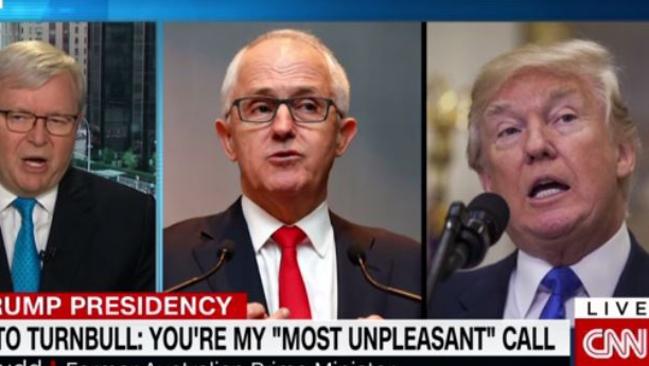
Meanwhile, in an interview on CNN today former Prime Minister Kevin Rudd was asked if these sort of conversations between allies were normal.
“No not normal I’ve got to say, it’s right out there,” he said.
He said it was clear this was a testy conversation and the transcript proved it.
“I think the real impact for this lies with Mr Turnbull in Australia,” he said.
He said Mr Trump’s position was clear for a long time but the content of what Mr Turnbull said in this conversation hadn’t been heard in Australia.
Mr Rudd said he believed it would impact domestic opinion of Mr Turnbull who “had been loose with the truth” over the refugee deal.
He also said to have the leak come from within the Trump administration was jaw dropping.
PASSAGE WE MISSED
Amid the transcript of the leaked phone call between President Trump and Prime Minister Malcolm Turnbull is a critical passage that’s easy to miss.
As Trump thinks through the implications of upholding an Obama-era deal that could allow 1250 refugees from Australian detention centres into the US in exchange for taking people the US wants to deport, he appears to spot a loophole.
“I hate having to do it, but I am still going to vet them very closely. Suppose I vet them closely and I do not take any?” Trump asked.
“That is the point I have been trying to make,” Turnbull replied.
“How does that help you?” Trump asks.
“Well, we assume that we will act in good faith,” Turnbull said.
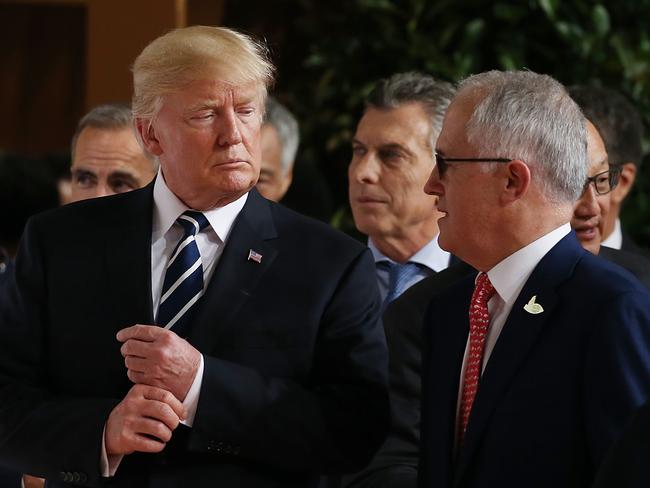
When Trump — who is clearly not across the finer points of Australian immigration policy — asked how he will know “who these people are”, Turnbull explained.
“We know exactly who they are. They have been on Nauru or Manus for over three years and the only reason we cannot let them into Australia is because of our commitment to not allow people to come by boat.”
“Otherwise we would have let them in. If they had arrived by aeroplane and with a tourist visa then they would be here.”
The Prime Minister said the people involved in the potential swap are “economic refugees” and are “not in that league” of “World Trade Centres” or “Boston Bombers” as Trump suspects.
“The only people that we do not take are people who come by boat. So we would rather take a not very attractive guy that helped you out than take a Nobel Peace Prize winner that comes by boat. That is the point,” Turnbull said.
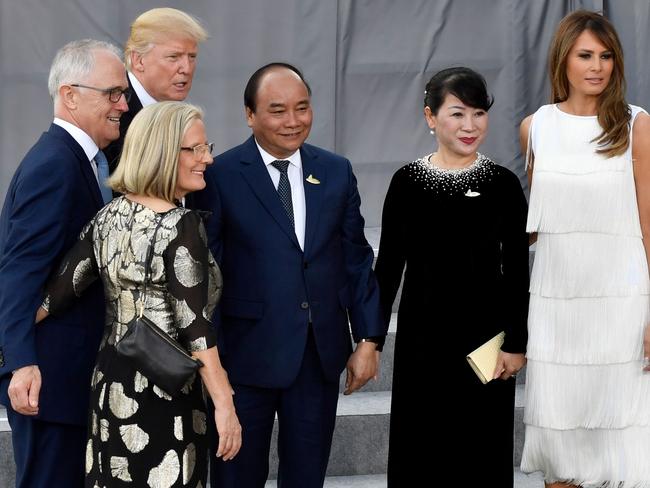
The comments cut to the heart of the debate around Australia’s controversial immigration policy that sees those arriving by boat transferred to offshore detention centres on Manus Island and Nauru.
The Turnbull government claims the policy is the only way to deter people smugglers and secure Australian borders. Critics say it is a “draconian” with Human Rights Watch calling to end “abusive offshore detention” and resettle those found to be refugees in Australia.
HRW Australia Director Elaine Pearson said the leaked transcript reveals how Australia’s foreign policy has been totally hijacked by immigration concerns.
“You would have thought the first call between these two leaders would have focused on more pressing matters of global security but instead, you have Australia’s Prime Minister desperately trying to persuade the US president to take a small number of refugees,” she said.
“Turnbull even admits that the US doesn’t even have to accept any refugees, but just go through the process of vetting.”
Amnesty International Australia’s Refugee Coordinator Graham Thom said the conversation showed Mr Turnbull was “rolling the dice with people’s lives and mental health.”
“Even more shameful is Turnbull’s admission that the US need not take these innocent people, only that the US is obliged to ‘go through the process’ of vetting them,” he said.
“This shows a complete disregard for these people, and begs the question of what exactly does the Australian Government plan to do with them?”
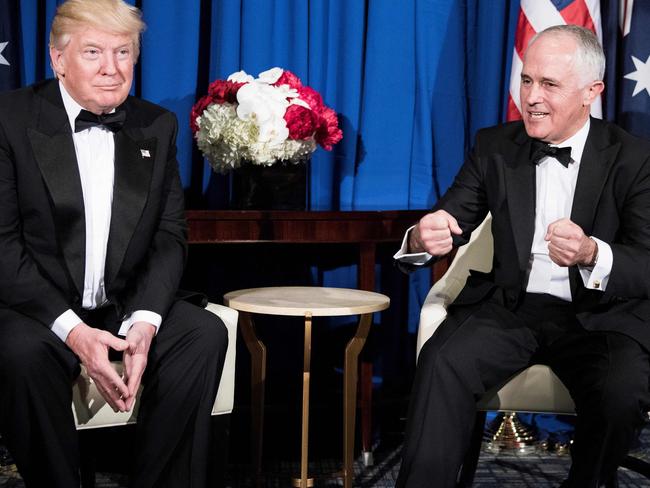
Either way, the controversial phone call reveals the desperation for both leaders to save face over promises they had made to their respective publics.
Turnbull also promised to “take more” and “take anyone that you want us to take” rather than accept people he has previously admitted are “economic refugees.”
‘ALL ABOUT TRUMP’
According to Dr David Smith, a senior Lecturer in American Politics and Foreign Policy at the United States Studies Centre and the School of Social and Political Sciences at the University of Sydney, the transcripts said everything about the President’s view on foreign policy.
Dr Smith said it showed Trump had no idea how to talk or deal with world leaders.
He said it also showed he was more concerned with fulfilling his campaign promises than using negotiating skills he should have mastered in the business world.
“The transcripts are useful in showing what Trump thinks about foreign policy,” he said.
“It’s actually more useful than any statement or analysis made by supporters or detractors.”
Dr Smith said the PM tried to appeal to the President’s business sense and played the negotiating card by suggesting ways he could save face over the deal.
The problem was the President was having none of it and instead was focused on the message he spouted on the campaign trail which was that the US getting the raw end of deals.
“Turnbull is aware of this and very early on tries to appeal to the President’s business sense,” he said.
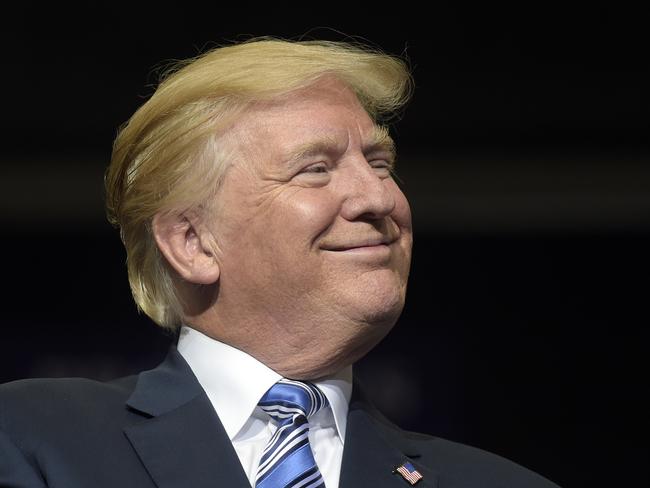
“But all Trump was concerned with was how the US is being abused by dumb deals.
“In his discussion with the Mexican President (Enrique Pena Nieto) it was also all about how other leaders were taking advantage of the US.”
Dr Smith said it was clear Mr Trump was unwilling to negotiate after the PM tried several times to explain how the refugee deal could work.
“Trump’s message is, the is US is copping the bad deals and other leaders aren’t as good as negotiating as he is,” he said.
“The problem is negotiations hit a standstill because neither Turnbull or Nieto are obliged to fulfil Trump’s campaign promises.”
Dr Smith he said it was also ironic for Trump to question why Australia discriminated against boats when his executive order discriminated against an entire religion.
In a tweet, Dr Smith’s fellow USSC fellow Ashely Townshend described the dialogue between the two leaders as “unbelievable”. That just about sums it up.
Unbelievable dialogue btw Trump and Turnbull over Australia's contentious "refugee deal" @USSC https://t.co/hINBJ78aKC
— Ashley Townshend (@ashleytownshend) August 3, 2017
Read the full transcript here.



